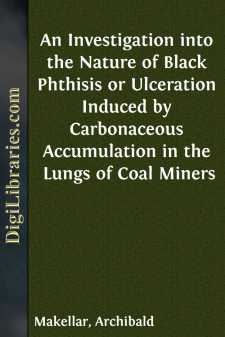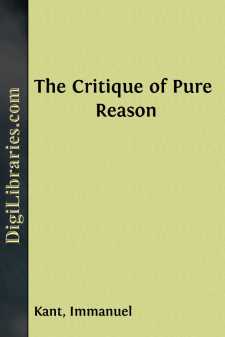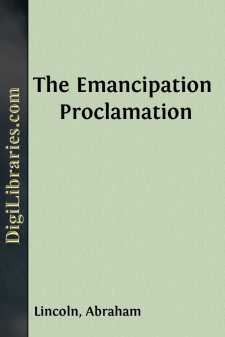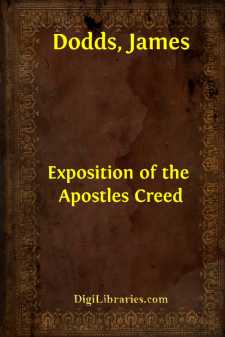Non-Classifiable
- Non-Classifiable 1768
Non-Classifiable Books
Sort by:
PREFACE. An abstract of the investigations into the nature of carbonaceous infiltration into the pulmonary tissues of coal miners, was read by Dr Makellar at a meeting of the Medico-Chirurgical Society of Edinburgh, Wednesday, 8th July, 1845, Dr Gairdner, President, in the Chair. Reference was made, in particular, to the East Lothian coal-miners. The carbonaceous disease described, was stated to be...
more...
by:
Various
INTRODUCTION The rigid conventionality of the theatre has been frequently remarked upon. Why the world should ever fear a radical, indeed, is hard to see, since he has against him the whole dead weight of society; but least of all need the radical be dreaded in the theatre. When the average person pays money for his amusements, he is little inclined to be pleased with something which doesn't amuse...
more...
by:
Immanuel Kant
I purposely omit the definitions of the categories in this treatise. I shall analyse these conceptions only so far as is necessary for the doctrine of method, which is to form a part of this critique. In a system of pure reason, definitions of them would be with justice demanded of me, but to give them here would only bide from our view the main aim of our investigation, at the same time raising doubts...
more...
by:
Abraham Lincoln
A PROCLAMATION Whereas on the 22nd day of September, A.D. 1862, a proclamation was issued by the President of the United States, containing, among other things, the following, to wit: "That on the 1st day of January, A.D. 1863, all persons held as slaves within any State or designated part of a State the people whereof shall then be in rebellion against the United States shall be then,...
more...
by:
Edward Thomas
CHAPTER I—BORROW’S AUTOBIOGRAPHY The subject of this book was a man who was continually writing about himself, whether openly or in disguise. He was by nature inclined to thinking about himself and when he came to write he naturally wrote about himself; and his inclination was fortified by the obvious impression made upon other men by himself and by his writings. He has been dead thirty years;...
more...
CHAPTER I INTRODUCTORY Good conversation is more easily defined by what it is not than by what it is. To come to any conclusions on this subject, one should first determine: What is the aim of conversation? Should the intention be to make intercourse with our fellows a free school in which to acquire information; should it be to disseminate knowledge; or should the object be to divert and to amuse? It...
more...
PREFATORY The following addresses were delivered at the request of various literary societies and commemorative committees. They amused me to write, and they apparently interested the audiences for which they were primarily intended. Perhaps they do not bear an appearance in print. But they are not for my brother-journalists to read nor for the judicious men of letters. I prefer to think that...
more...
BIRDS THAT LIVE IN NESTING BOXES. Certain varieties of birds will nest in homes built for them if these houses are of the right shape and dimensions. Other birds may be just as desirable but do not build nests and rear their young in boy-made nesting boxes. We are therefore mainly concerned with the first group which select cavities in trees for their homes if nothing better is to be found. FIG. 1....
more...
by:
Richard Johnson
My Beloved, I do not think it necessary to make an apology for putting this Address into your hands; or to enter into a long detail of the reasons which induced me to write it. One reason may suffice. I find I cannot express my regard for you, so often, or so fully, as I wish, in any other way. On our first arrival in this distant part of the world, and for some time afterwards, our numbers were...
more...
by:
James Dodds
While the disciples had Jesus with them, there was no occasion for a formal summary of the doctrines which His followers were called to accept and to maintain. He was present to resolve all doubts and settle all difficulties, so that when their faith was assailed or their teaching impugned they could refer to Him. Then, as now, faith had Him for its object,—with this difference, that He was visibly...
more...











